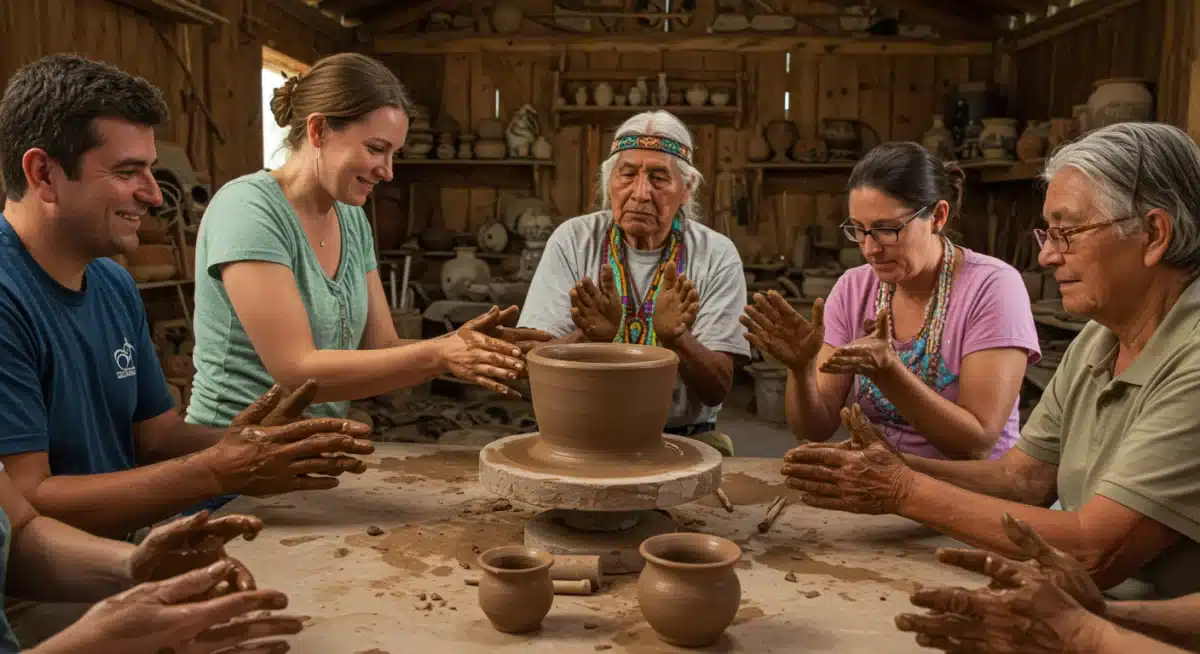Experiential Travel Trends: 3 New Cultural Immersion Programs Reshaping US Tourism in 2025

Three innovative cultural immersion programs are poised to redefine US tourism in 2025, emphasizing authentic local experiences and sustainable travel, as demand for experiential journeys continues to surge.
As we move into 2025, a significant shift in travel preferences is underway, with travelers increasingly seeking authentic, meaningful connections over conventional sightseeing. This evolving landscape is directly influencing Experiential Travel Trends: How 3 New Cultural Immersion Programs are Reshaping U.S. Tourism in 2025. These groundbreaking initiatives promise to transform how visitors engage with American culture, moving beyond superficial encounters to offer deep, personal experiences that resonate long after the journey ends.
The Rise of Immersive Travel Experiences
The travel industry is witnessing a profound transformation, driven by a growing desire for authentic connections. Modern travelers prioritize experiences that offer genuine insight into local cultures, traditions, and daily life. This trend is not merely about visiting a destination but about becoming a temporary part of it, fostering a deeper understanding and appreciation.
The demand for immersive travel has surged post-pandemic, as individuals seek more meaningful ways to spend their leisure time and broaden their perspectives. Tour operators and destinations are responding by curating programs that move beyond passive observation, encouraging active participation and interaction. This shift is particularly evident in the United States, where a diverse cultural tapestry offers fertile ground for such initiatives.
Defining Cultural Immersion
Cultural immersion goes beyond guided tours. It involves direct engagement with local communities, learning traditional skills, participating in local customs, and often living alongside residents. This approach allows travelers to gain a nuanced understanding of a place and its people, fostering empathy and cross-cultural dialogue.
- Authentic Interactions: Direct engagement with locals, not just observing.
- Hands-On Learning: Participating in traditional crafts, cooking, or art forms.
- Community Integration: Opportunities to live, eat, and socialize within local communities.
- Personal Growth: Experiences that challenge perspectives and encourage self-reflection.
Program 1: “Heartland Roots & Rhythms” in the Mississippi Delta
One of the most anticipated programs reshaping US tourism in 2025 is “Heartland Roots & Rhythms,” launching in the Mississippi Delta. This initiative focuses on the rich cultural heritage of African American communities, particularly their profound influence on American music, cuisine, and civil rights history. Participants will delve into the origins of blues music, experience traditional Southern hospitality, and engage with local storytellers.
The program, developed in partnership with local community leaders and historical societies, aims to provide an unvarnished look at the region’s past and present. It emphasizes ethical tourism, ensuring that economic benefits directly support the communities visited, promoting sustainable development and cultural preservation. This direct impact on local economies is a key draw for conscious travelers.
Key Experiences Offered
Travelers on the “Heartland Roots & Rhythms” program will engage in a variety of activities designed for deep immersion. These include workshops, performances, and community meals, fostering a sense of belonging and shared understanding.
- Blues Music Workshops: Learn to play instruments and sing with local musicians.
- Culinary Journeys: Participate in cooking classes focused on traditional Southern dishes.
- Historical Tours: Visit significant civil rights landmarks and hear firsthand accounts.
- Community Gatherings: Attend local church services or community events.
Program 2: “Southwest Sacred Lands & Stories” with Native American Tribes
The second groundbreaking program, “Southwest Sacred Lands & Stories,” offers an unparalleled opportunity for cultural immersion with various Native American tribes across Arizona and New Mexico. This program, launching in early 2025, is designed in close collaboration with tribal elders and cultural preservationists to ensure respectful and authentic engagement. It focuses on the ancestral lands, traditional practices, and contemporary life of indigenous peoples.
Participants will learn about sustainable living practices, ancient art forms, and the spiritual connection to the land. The program aims to educate travelers on the diverse histories and vibrant cultures of Native American communities, dispelling stereotypes and fostering genuine appreciation. All activities are guided by tribal members, providing unique perspectives and direct access to their rich heritage.
Engaging with Indigenous Culture
This program offers a blend of historical context and living traditions. Travelers will gain insights into the resilience and wisdom of Native American cultures through direct interaction and shared experiences. The emphasis is on learning and respect, rather than mere observation.
Activities include visits to sacred sites, participation in traditional ceremonies (where appropriate and invited), and hands-on workshops. The journey is designed to be transformative, offering a profound connection to the land and its original stewards. The program is a powerful example of how cultural immersion programs can bridge understanding and promote respectful dialogue between different communities.

Program 3: “Appalachian Artisans & Heritage Trails”
The third significant new program, “Appalachian Artisans & Heritage Trails,” invites travelers to explore the rugged beauty and rich cultural traditions of the Appalachian Mountains. Slated for a mid-2025 launch, this initiative highlights the resilience, craftsmanship, and musical heritage of Appalachian communities. It offers a deep dive into folk art, traditional music, and the unique history of the region.
This program is a collaboration between local artisan guilds, environmental conservation groups, and community tourism boards. It underscores the importance of preserving traditional skills and supporting local economies through responsible tourism. Travelers will have the opportunity to learn directly from master craftspeople and musicians, experiencing the warmth and hospitality characteristic of the Appalachian spirit.
Discovering Appalachian Traditions
Participants in “Appalachian Artisans & Heritage Trails” will engage in a variety of immersive activities, from learning traditional music to crafting with local materials. The program is designed to showcase the enduring cultural legacy of the mountains.
- Folk Music Jams: Learn to play instruments like the banjo or dulcimer with local musicians.
- Craft Workshops: Participate in weaving, pottery, or wood carving sessions.
- Storytelling Circles: Hear tales and legends passed down through generations.
- Nature Hikes: Explore the region’s biodiversity with local guides, connecting to the land.
Impact on U.S. Tourism and Local Economies
These new cultural immersion programs are not just offering unique travel experiences; they are actively reshaping the landscape of U.S. tourism. By focusing on niche, authentic experiences, they attract a different demographic of traveler—one often willing to spend more for quality, meaning, and direct community benefit. This translates into significant economic advantages for often underserved rural and indigenous communities.
The programs also promote a more sustainable form of tourism, encouraging longer stays, deeper engagement, and a reduced environmental footprint compared to mass tourism. They foster cultural exchange and understanding, which can have long-term positive effects on community relations and national identity. The emphasis on local guides and artisans ensures that tourism revenue circulates within the community, creating jobs and supporting cultural preservation efforts.
Sustainable Tourism Practices
A core tenet of these programs is sustainability. This includes not only environmental considerations but also cultural and economic sustainability. By empowering local communities to lead the tourism experience, these programs ensure that their heritage is respected and celebrated, not commodified.
- Community-Led Initiatives: Programs designed and managed by local residents.
- Economic Empowerment: Direct financial benefits to local artisans, guides, and businesses.
- Cultural Preservation: Support for traditional arts, languages, and practices.
- Environmental Stewardship: Practices that minimize ecological impact and promote conservation.
The Future of Experiential Travel Trends
The launch of these three programs signals a clear direction for the future of travel. Experiential travel is moving from a niche interest to a mainstream expectation, with travelers actively seeking opportunities for personal growth, learning, and genuine connection. This trend is pushing the industry to innovate, offering more specialized and authentic itineraries that cater to a discerning audience.
Looking ahead, we can expect to see more destinations and tour operators adopting similar models. The success of these initial programs will likely inspire further development of initiatives that celebrate America’s diverse cultural heritage, from urban ethnic enclaves to remote wilderness communities. The focus will remain on creating meaningful interactions that benefit both the traveler and the host community, solidifying experiential travel as a cornerstone of U.S. tourism. These cultural immersion programs are setting a new standard.
| Key Program | Brief Description |
|---|---|
| Heartland Roots & Rhythms | Focuses on African American cultural heritage in the Mississippi Delta, including blues music and civil rights history. |
| Southwest Sacred Lands & Stories | Offers immersive experiences with Native American tribes in the Southwest, exploring ancestral lands and traditions. |
| Appalachian Artisans & Heritage Trails | Explores the folk art, traditional music, and unique history of Appalachian communities. |
| Impact on Tourism | Promotes sustainable tourism, supports local economies, and fosters deeper cultural understanding. |
Frequently Asked Questions About Cultural Immersion Programs
Cultural immersion programs go beyond sightseeing, focusing on active participation in local life, traditions, and learning experiences. Unlike typical tours, they prioritize direct interaction with communities, hands-on activities, and a deeper understanding of the local way of life, fostering personal growth and cross-cultural empathy.
These programs provide direct economic benefits by employing local guides, supporting artisans, and driving revenue to small businesses. They also aid in cultural preservation by valuing traditional practices and storytelling, ensuring that the economic gains from tourism remain within the community and support its heritage.
While designed for those seeking authentic, meaningful experiences, these programs may require an open mind and a willingness to engage actively. They are ideal for travelers interested in learning, personal growth, and respectful interaction with diverse cultures, often involving more hands-on participation than conventional travel.
Sustainability is a core principle, encompassing environmental, cultural, and economic aspects. Programs are community-led, ensuring respect for local customs and minimal ecological impact. They aim for long-term benefits for host communities, promoting responsible travel practices and cultural exchange over mass tourism.
Travelers interested in participating should monitor official tourism websites for the Mississippi Delta, Southwest Native American tribes, and Appalachian regions. Details regarding booking, itineraries, and specific launch dates for “Heartland Roots & Rhythms,” “Southwest Sacred Lands & Stories,” and “Appalachian Artisans & Heritage Trails” will be available soon.
What Happens Next
The introduction of these three new cultural immersion programs marks a pivotal moment for U.S. tourism in 2025. Industry analysts expect these initiatives to serve as blueprints for future travel offerings, driving a broader shift towards authentic, community-centric experiences. As demand for meaningful travel continues to grow, watch for more destinations to embrace similar models, prioritizing local partnerships and sustainable practices. The success of these programs will undoubtedly influence investment and policy decisions within the travel sector, further solidifying experiential travel as a dominant force in the global tourism market.